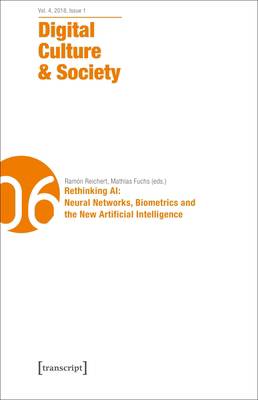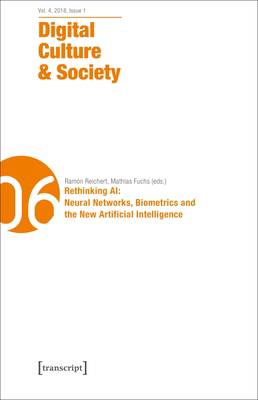
- Afhalen na 1 uur in een winkel met voorraad
- Gratis thuislevering in België vanaf € 30
- Ruim aanbod met 7 miljoen producten
- Afhalen na 1 uur in een winkel met voorraad
- Gratis thuislevering in België vanaf € 30
- Ruim aanbod met 7 miljoen producten
Zoeken
Digital Culture & Society (Dcs)
Vol. 4, Issue 1/2018 - Rethinking Ai: Neural Networks, Biometrics and the New Artificial Intelligence
Annika Richterich, Karin Wenz, Mathias Fuchs, Pablo Abend, Ramon Reichert
€ 54,45
+ 108 punten
Omschrijving
Digital Culture & Society is a refereed international journal, fostering discussion about the ways in which digital technologies, platforms, and applications reconfigure daily lives and practices. It offers a forum for inquiries into digital media theory, methodologies, and sociotechnological developments. This issue shows: The meaning of AI has undergone drastic changes during the last 60 years of AI discourse(s). What we talk about when saying AI is not what it meant in 1958, when John McCarthy, Marvin Minsky and their colleagues started using the term. Biological information processing is now firmly embedded in commercial applications like the intelligent personal Google Assistant, Facebook's facial recognition algorithm, Deep Face, Amazon's device Alexa, or Apple's software feature Siri to mention just a few.
Specificaties
Betrokkenen
- Auteur(s):
- Uitgeverij:
Inhoud
- Aantal bladzijden:
- 200
- Taal:
- Engels
- Reeks:
Eigenschappen
- Productcode (EAN):
- 9783837642667
- Verschijningsdatum:
- 26/06/2018
- Uitvoering:
- Paperback
- Formaat:
- Trade paperback (VS)
- Afmetingen:
- 155 mm x 241 mm
- Gewicht:
- 430 g

Alleen bij Standaard Boekhandel
+ 108 punten op je klantenkaart van Standaard Boekhandel
Beoordelingen
We publiceren alleen reviews die voldoen aan de voorwaarden voor reviews. Bekijk onze voorwaarden voor reviews.








